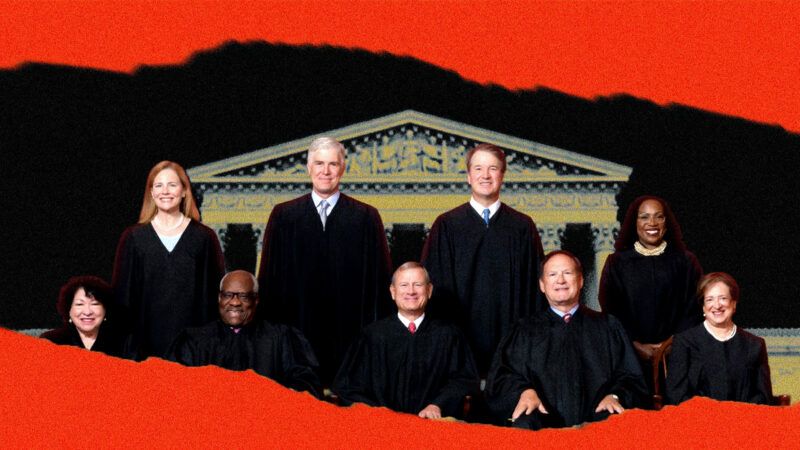Warrantless Searches, Tariffs, and the Unitary Executive: 3 SCOTUS Cases To Watch This Fall
In a new Supreme Court term packed with big cases, these disputes stand out.

The U.S. Supreme Court is officially back in session this week, kicking off a new term that is already packed with major cases dealing with some of the most contentious and consequential issues of our time. As the Court's fall term gets underway, here are the three big cases that I will be tracking most closely.
You’re reading Injustice System from Damon Root and Reason. Get more of Damon’s commentary on constitutional law and American history.
1. Case v. Montana
The Fourth Amendment to the U.S. Constitution protects "the right of the people to be secure in their persons, houses, papers, and effects, against unreasonable searches and seizures." Most of the time, that means that law enforcement may not enter your home without a warrant.
But the federal courts have also carved out a big exception to the warrant requirement for home entry when an emergency is (or might be) afoot.
That emergency exception to the Fourth Amendment is at the heart of this case, which asks the justices to decide the following question: "Whether law enforcement may enter a home without a search warrant based on less than probable cause that an emergency is occurring, or whether the emergency-aid exception requires probable cause." If the cops think—or claim to think—that an emergency might be happening inside, is that enough to allow the cops to bust down the door and start searching?
Oral arguments in Case v. Montana are scheduled for October 15.
2. Learning Resources v. Trump
According to Article I, Section 8 of the Constitution, the authority "to lay and collect Taxes, Duties, Imposts and Excises," as well as the authority "to regulate Commerce with Foreign nations," resides exclusively in the hands of Congress.
Yet President Donald Trump has unilaterally imposed tariffs on much of the world without receiving any kind of clear authorization from Congress. Is that legal?
In this case, which has been consolidated with the related matter of Trump v. V.O.S. Selections, the Supreme Court will finally weigh in on whether Trump's tariffs violate the constitutional separation of powers. In a SCOTUS term that's full of potentially blockbuster cases, this one is easily among the biggest and most important.
Oral arguments in Learning Resources v. Trump are scheduled for November 5.
3. Trump v. Slaughter
In 1935, the Supreme Court ruled 9–0 against President Franklin Roosevelt, holding that he lacked the lawful power to fire a commissioner of the Federal Trade Commission (FTC) for purely political reasons. Yet earlier this year, Trump fired FTC Commissioner Rebecca Slaughter for purely political reasons, arguing that he possessed the power to do so as the head of the executive branch.
This case asks whether Trump does in fact possess the executive power to fire the heads of "independent" federal agencies at will. The case also asks whether the Court's 1935 precedent against Roosevelt should be overturned.
Here's a funny thing about this one: Despite the heated and far-reaching debate over presidential power that it involves, the outcome feels predetermined. That's because the Supreme Court has already allowed Trump's firing of Slaughter to go into effect while the case proceeds, which suggests (but does not guarantee) that Trump is going to win on the merits in a few months. What is less clear is whether the Court will rule in Trump's favor by voiding the past precedent, or will instead hand him the win in a way that narrows the precedent without overruling it outright. We'll see.
Oral arguments in Trump v. Slaughter have not been scheduled yet, but the docket does instruct the Supreme Court's clerk "to establish a briefing schedule that will allow the case to be argued in the December 2025 argument session." So I would expect this one to be argued sometime around mid-December.
Big Picture
Finally, looking at the big picture, here's something additional to ponder. In recent years, a single hot-button issue like abortion or affirmative action has emerged as the big defining story of a given SCOTUS term. This term, the big defining story is presidential power. This means that the big questions heading into the term are whether the Supreme Court will largely defer to Trump's executive assertions, or whether the Court will act as a check on at least some parts of Trump's agenda, such as by striking down his tariffs. To put that another way, will Trump in particular, and executive power in general, emerge stronger than ever as a result of the actions taken this term by a majority of the Supreme Court?
We'll get our first hints as to the answers to those questions in the next few months.


Show Comments (22)